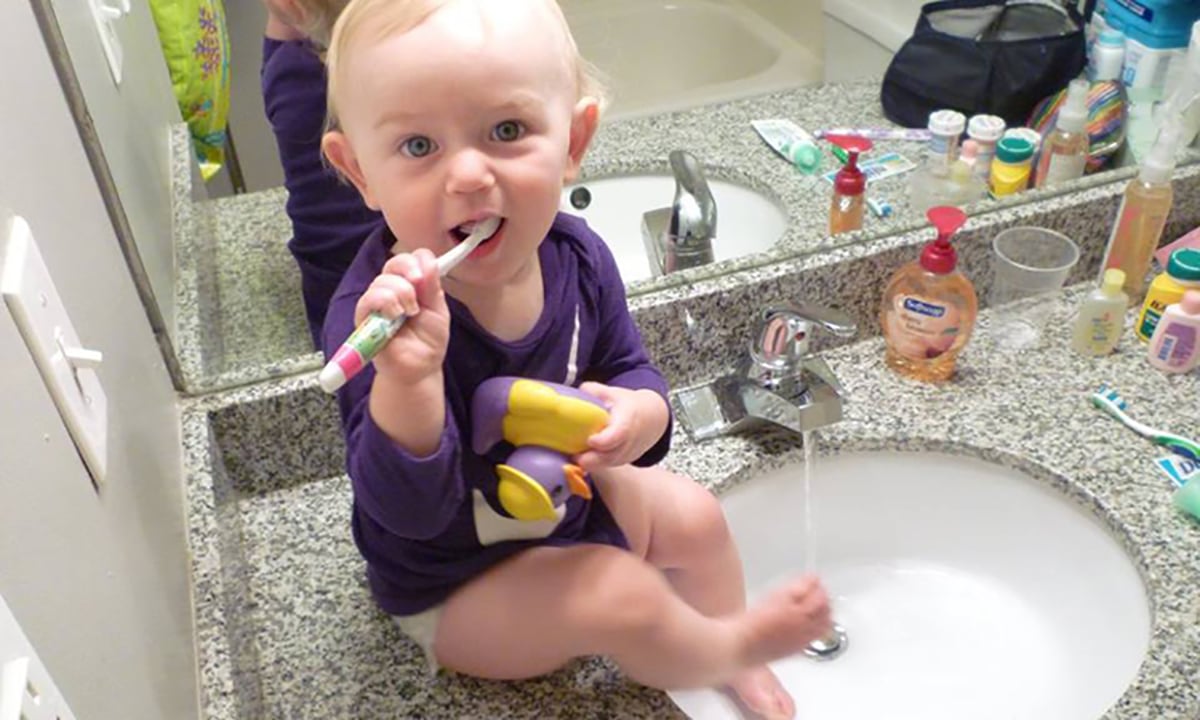

Like many first-time moms, I over-prepared for everything before my daughter, Alyssa, was born. In the oral care department alone, that meant I had teething toys and baby Orajel all ready to go. I knew about teething fevers and prepared a bag of tricks for dealing with the inevitable mouth woes my little one would face.
Around nine months, Alyssa started drooling profusely and developed a low-grade fever. I knew the time had come, and, sure enough, two little bottom teeth erupted soon after.
“Those are teeth!” I exclaimed, holding her lip down so my husband could see. “Oh my gosh, our baby girl has teeth. I can’t believe it!”
“This is amazing!” my husband said. “So, now what?”
For once, I was speechless. Now what, indeed. I spent so much time fixating on teething troubles and symptoms, I’d neglected to research what to do when teeth actually arrive!
Here's what I eventually learned.
RELATED: What It's Really Like When Dad's a Dentist
1. Yes, You Need to Start Brushing!
(My daughter) actually cries when we put our toothbrushes away!
I thought there was no way my daughter needed to actually brush her teeth at this young of an age. I thought maybe all I’d have to do is swirl her mouth with some water before bed or something. But the fact is, as soon as teeth appear, oral hygiene begins.
Brush your baby’s teeth for about 20 seconds twice a day with a soft-bristled toothbrush. There are many training toothpastes out there marketed to children, but there’s no reason they can’t have small amounts of adult toothpaste. For children under 3, squirt on a rice-grain-sized amount of the toothpaste you use, fold their lips back and brush away.
Like anything you want to train your baby to do, make it part of a consistent routine and make it fun. My husband and I set our daughter up on the bathroom counter (which is special because she’s not allowed up there otherwise) and brush our teeth in front of her first as a demonstration. Then, we brush her teeth for 20 seconds. After that, we let her take control of the brush so she can practice on her own. She loves it and will even try to pry open our mouths to brush our teeth for us. She actually cries when we put our toothbrushes away!
2. No More Night Bottles
This change is something my family is still working on. At some point, it may have become the norm to put your baby to bed with a bottle of formula, milk or breastmilk. Once your little angel has teeth, however, this needs to stop.
The milk, formula or breastmilk in your baby’s mouth will sit on his or her teeth for eight hours (or longer, if you’re lucky) and can cause tooth decay. This is because when your child is awake, he or she is chewing on things, babbling and constantly opening his or her mouth. These actions promote saliva, which cleans the mouth. At night, however, saliva production slows down, and the milk or formula will just sit there on the teeth.
Start your transition by switching to water in the bottle at night, and don’t give milk or formula until your child has brushed his or her teeth in the morning.
3. Going to the Dentist Once the First Tooth Emerges Will Save You a Lot of Stress
Some sources say to take your child to the dentist as soon as the first tooth emerges, but others will say you can wait (the amount of time varies). I got tired of wading through all the theories and picked up the phone instead. I called Dr. Price, my dentist, who has been taking care of my teeth since I was my daughter’s age. He said that he typically asks parents to bring their child in for an initial visit when the first teeth appear. However, that visit is aimed at parental education, not necessarily doing anything special to the child’s teeth. Many parents don’t know how to care for their own mouths, or are a smidge lazy about their own oral health.
I told Dr. Price what I’d discovered in my own research about brushing and eliminating night bottles. “All that’s what I would have told you, had you come in for that first appointment,” he told me. “You always do a great job with your oral care. Just teach your daughter the same thing. I’m not worried about you.” He reassured me that if I ever noticed anything out of the ordinary, or had any concerns, I could bring her in whenever I thought she needed to be seen. However, barring any problems, he didn’t need to see her until she turned 3.
RELATED: Everything About Shakeology Is an Insult and Wrong
Needless to say, it's time to examine your own oral hygiene routine. Do you brush and floss? If not, it’s time to start. Not only that, start brushing and flossing in front of your children. Kids always want to do what the big people are doing anyway, right? If you have questions, or are confused by conflicting advice and information, call your trusted dentist. Here’s to no cavities!
Photograph by: Amelia Kibbie







